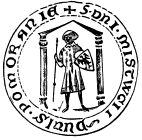Mestwin II.
Mestwin II ( Polish Mszczuj , Mściwój ; * before 1220 ; † December 25, 1294 ) was Duke of Pommerellen in Schwetz from 1250 , from 1269/71 in Stolp , Belgard , Dirschau , from 1272 in Danzig , from 1275 in Schlawe and Rügenwalde . He was the last sovereign Duke of Pomerania from the Samborid dynasty ; with him his line died out in the male line .
Life
Mestwin was the elder of Duke Swantopolk II's two sons .
During armed conflict between his father and the Teutonic Order , he was taken prisoner in 1243 and was only released in 1248. During his father's lifetime, in 1250, he was granted partial rule over the area around Schwetz.
In 1264 he signed a secret inheritance contract with Duke Barnim I of Pomerania , his cousin , in Kammin , which he could expect after the death of his father Swantopolk, in order to obtain the Pomeranian support in the upcoming power struggle against his brother Wartisław II. († 1275) and Uncle Sambor II . In September 1264, Mestwin traveled to Cammin and in the event of his death, Duke Barnim I hereditary prescribed the land of Schwetz and all the dominions that came to him after the death of his father, Swantopolks II († 1266), and his brother, Wartisław II, which were both still alive at the time, could fall. Duke Barnim accepted the gift, but Mestwin II later changed his mind.
Mestwin received the southern Pomeranian with Schwetz and the nominal supremacy over the partial duchies in the division of the estate after the death of his father in 1266; the northern part of the duchy with Danzig, Belgard, Stolp and Schlawe went to Wartisław. The domain of his uncle Sambor II in Dirschau remained.
Immediately after Swantopolk's death, the Pomeranian Duke Barnim I advanced into the area around Schlawe and Rügenwalde, which Swantopolk had acquired decades ago. Around 1270 he gave the territory to Prince Wizlaw II of Rügen , a grandson of Swantopolk II, as a pledge , presumably because of the claims to his mother's marriage property, which he lost to Mestwin by 1275 at the latest. The Rüganer immediately sold his liens on the land of Schlawe and Rügenwalde in 1277 for a sum of 3,600 marks to the Mark Brandenburg . At the same time, Mestwin and his brother Wartisław began again in the spring of 1267 disputes with the Teutonic Order; but already in the summer of 1267 Wartisław and early 1268 Mestwin had to make peace.
In this politically difficult situation, Mestwin placed himself under the protection of the Ascanian Margraves of Brandenburg by recognizing their enfeoffment with Pomerania, which had already been made by Emperor Friedrich Barbarossa and renewed in Ravenna in December 1231 by Emperor Friedrich II . In the Treaty of Arnswalde on April 1, 1269 he took his sphere of influence from the Brandenburgers as a fief . As suzeraines of the Duchy of Pomerania, the Brandenburg Ascanians were obliged to protect it.
Due to his feudal relationship with the Margraviate of Brandenburg, Mestwin got into trouble in the course of 1269. Wartisław and his uncle Sambor II allied themselves with the Schwetz knighthood against him. Around the middle of 1270 Mestwin asked the Brandenburgers for military assistance. He promised them the castle and city of Danzig (which did not previously belong to him) as compensation for their support. The Brandenburg troops under Konrad I , a son of Margrave Johann I , who was already entitled to feudal sovereignty over Pomerania and thus also over Danzig, took Danzig in the spring of 1271.
After eventful battles, Wartisław and Sambor subsequently lost the power struggle and sought support from the Teutonic Order and Kujawy .
In 1271, after his uncle Sambor had fled and his brother Wartisław died, Mestwin became heir and sole ruler of the lands of Schlawe and Rügenwalde, which had passed to Prince Wizlaw von Rügen and Danzig, which the margraves had kept in their hands Pomeranian. In retrospect he regretted his commitment to the Brandenburgers, who refused to hand over the main Pomeranian festivals to him. Thereupon Mestwin besieged Danzig, which was successfully defended by Margrave Konrad, who had found the support of the German-speaking patriciate of Danzig. Mestwin then allied himself with his cousin Duke Bolesław of Wielkopolska . With his help he took the city of Danzig by storm in January 1272, took the castle and drove out the Brandenburgers, his liege lords. Mestwin made peace with the city, which had to lay down its fortifications. Leading citizens who sided with the Brandenburgers were punished, some with death, others with the deprivation of their property.
In 1273 Mestwin signed a peace treaty with the Mark Brandenburg. He also renewed his feudal relationship with her in the contract at the Dragebrücke over the countries of Stolp, Rügenwalde and Schlawe. In 1272 the Teutonic Order, after the death of Ratibor , acquired Mestwin's uncle, who abdicated as duke in 1262, his sovereign rights in western Pomerania around Belgard.
The feudal treaty with the Ascanians also contained a promise of alliance against both enemies, an obligation to serve against Bolesław of Greater Poland, who, like the Pomeranian dukes, was in dispute with the Margraviate of Brandenburg, was expressly excluded. In 1278, despite the treaty of 1273, Mestwin supported the Duchy of Greater Poland militarily in the fight against the Brandenburgers. The friendship continued from 1279 with Bolesław's successor, Duke Przemysław II . Although Mestwin was only related to him through a female sideline, he set him up on February 15, 1282 in Kempen to inherit his land in the form of a "donation among the living", although Pommerellen had the Pomeranian dukes of the Szczecin line according to the main line's inheritance law have to fall, and thus provoked a dispute over the succession. At the same time he made him his deputy during his lifetime. In the following years Mestwin tried to secure Przemysław's succession in Pomerania. In 1287 he concluded a peace alliance with the Bishop of Cammin and caused the Pomeranian barons to agree to his donation and to pay homage to Przemysław .
With the Teutonic Order, Mestwin concluded the settlement of Militsch in 1282 , in which he ceded the Mewer Land , which the Sambor expelled from Mestwin had assigned to the order in 1276. Mestwin renounced his claims to the land of Belgard in Pomerania in favor of Duke Bogisław IV. Prince Wizlaw II of Rügen and the Brandenburgers did not renounce their feudal rights or sovereign rights in Pomerania; they agreed on March 12, 1289 and 1292, respectively, to divide Pomerania among themselves after Mestwin's death. But they tried to enforce their claims militarily only at the beginning of the 14th century (Rügen 1300-1302 under Sambor von Rügen, a son of Prince Witzlaw II ; Mark Brandenburg 1308-1309 under Otto IV and Waldemar ).
The last twelve years of Mestwin's rule have been peaceful. Duke Mestwin II died on December 25, 1294 without a male heir. With that the Pomeranian ruling house of the Samborids became extinct in the male line. Duke Przemysław of Wielkopolska succeeded in his capacity as Duke of Pomerania without difficulty. He was crowned King of Poland on June 16, 1295 by the Archbishop of Gniezno , but was murdered in February 1296. This was followed by the long Pomeranian succession dispute, as a result of which the Teutonic Order in 1309, in agreement with the Margraviate of Brandenburg and bypassing the state rights of the Polish crown, took possession of the greater part of the duchy. After the loss of Danzig to the Teutonic Order in 1308, only the western parts of the Duchy around Stolp, Schlawe and Rügenwalde (1308-1317), which these areas in the Treaty of Templin 1317 to the Duchy of Pomerania- Volgast, remained permanently with the Brandenburgian Ascani handed over, while Poland under Władysław I. Ellenlang and the Principality of Rügen after 1309 missed out on the power struggle for the Pomeranian inheritance.
Marriage and offspring
Mestwin was married three times. His first wife was Jutta (Judith; † around 1275), daughter of Dietrich I, Count of Brehna and Wettin , from the house of the Wettins , whom he married around 1250. In his second marriage after 1275 he married Euphrosyna (Euphrosyne; † 1292), daughter of the Upper Silesian Duke Casimir I. This marriage was unhappy and was divorced in 1288. After the divorce from his second wife, he married Sulisława († after 1292), a former nun from the Premonstratensian monastery in Stolp.
From the marriage with Jutta von Wettin-Brehna two daughters emerged:
- Katharina (approx. 1250–1312), from around 1269 as the wife of Duke Pribisław II († 1316) by marriage titular Duchess of Mecklenburg in Parchim-Richenberg and Duchess of Belgard in Pomerania;
- Eufemia (approx. 1260–1317), from approx. 1273 as the wife of Count Adolf V († 1308) by marriage to Countess von Holstein in Segeberg ;
literature
- Ernst Strehlke : Documents of Duke Mestwin II. From the Count's Krockow family archive in Krockow . In: Old Prussian monthly writing , Volume 8, Königsberg 1871, pp. 633–642 .
- John Brown Mason: The Danzig Dilemma. A Study in Peacemaking by Compromise. 1946 ( Google Book Search )
- Max Perlbach : Mestwin II. In: General German Biography (ADB). Volume 21, Duncker & Humblot, Leipzig 1885, pp. 504-506.
Web links
Individual evidence
- ↑ Under his father's nominal supremacy until 1266
- ↑ After his brother and uncle were ousted in the civil war
- ^ After the expulsion of the Brandenburgers; Duchy of Pomerania united in 1272, Duke Mestwin II. De facto sole ruler
- ^ After Wizlaw II was expelled from the area by 1275 at the latest
- ↑ Rodgero Prümers (arrangement): Pommersches Urkundenbuch . Volume 2, Section 1. Szczecin 1881, No. 760 ( online ).
- ↑ Possibly not until 1269, in response to the conclusion of the Treaty of Arnswalde between Mestwin and the Brandenburg margraves, with whom Duke Barnim was in dispute
- ^ Gustav Kratz : The cities of the province of Pomerania , pp. 327–328 and 348
- ↑ Scriptores rerum Prussicarum , Volume I, loc. cit, pp. 708-709, note 91
- ^ Friederich II. Roman Kayser, enfeoffed Johannem and his brother Ottonem, seel. Marggraffen Alberti sons, with the Marck Brandenburg and the Hertzogthum Pommern, like this one to her father and the previous Marggraffen zu Brandenburg was bestowed by him and his ancestors. In: Friedrich von Dreger : Codex Pomeraniae diplomaticus. Volume I except for the year 1269 including Haude and Spener, Berlin 1768, pp. 149–152, no. LXXXVII .
- ↑ Martin Wehrmann : History of Pomerania . First volume, Waidlich Reprints, Frankfurt 1981 (unchanged reprint of the first edition from 1904/06), p. 99.
- ↑ Rügenwalde and Schlawe were under direct Rügen rule at the time the contract was signed, in 1273
| personal data | |
|---|---|
| SURNAME | Mestwin II. |
| ALTERNATIVE NAMES | Mszczuj; Mściwój |
| BRIEF DESCRIPTION | Duke of Pomeranian |
| DATE OF BIRTH | before 1220 |
| DATE OF DEATH | December 25, 1294 |



